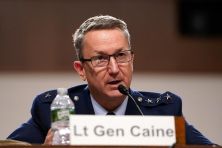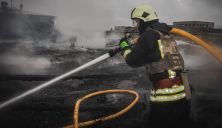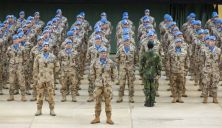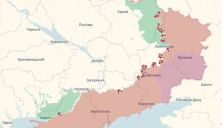The U.S. foreign policy has been reactive rather than proactive for the last 4 years and world leaders expect Trump to change it when he comes into power. In this interview with Ivan Stupak we discuss these topics.
— I would like to discuss with you the current geopolitical agenda that is shaped at the moment by the President-elect Trump and his possibly new Department of Defense and other departments. The first one is an interesting opinion that all this show with Canada, with Greenland, with the Panama Channel, all the allegations and claims, is a geopolitical and diplomatic move to take back the initiative from the “axis of evil” — from Russia, Iran, who have been doing something and then the United States reacts — to make United States foreign policy not reactive but proactive. What do you think about that?
— Oh, it’s a tricky question. Look, currently, right now, we are not totally sure what would be the foreign policy of Mr. Trump and his team after January 20th… yeah, January 21st, after his inauguration as President of the United States. Nobody knows. Nobody knows about his team, nobody knows for 100% about his advisors, his people who will realize his policy over Ukraine, over Iran, North Korea, etc., etc., etc.
So, I prefer to stay in the “wait until Mr. Trump forms his team and starts making his own policy” mode.
As it’s mentioned, about Iran, or North Korea, and currently, right now, we are totally sure, and there are lots of rumors we can hear, that Mr. Trump definitely realizes that it’s impossible, totally impossible, to finish the Russia-Ukraine war in 24 hours as he declared before the election campaign. So, now he understands that it will take probably several months to reduce this war or to move it toward the finish.
— And also, we have the hearings in the United States about the new nominee for the defense secretary. And on those hearings, he said that, “We know who is the aggressor, and we know who defends. We would like Ukraine to be in the strongest position possible.” Do you think that will change the United States’ policy according to Ukrainian aid? The support for Ukraine in this war against Russia will lead to escalation, or will this deter further escalation from the Russian side?
— Unfortunately, right now, these words are not enough to reduce this war, to move to the point of ceasefire. I will explain why. Because the Secretary of Defense is just a position. Okay, he is the highest official in the military hierarchy, but he totally depends on political decisions of Mr. Trump.
And as I mentioned before, nobody knows what would be Mr. Trump’s policy about supplying Ukraine with military equipment, supplying Ukraine with military aid, with funds, etc., etc. So, okay, right now it’s a good sign to Ukraine that support will continue. But nobody knows exactly.
— Yes. And concerning other peculiarities of what has recently happened, we have seen several North Korean captives captured in the Kursk region. And recently, we have one more confession and interrogation of another prisoner of war. How is the world… I cannot say “reacting,” because there is a complete lack of reaction except for South Korea, which asks Ukraine to send them back to South Korea.
— Look, it’s an incredibly interesting topic we would like to discuss, but we have to understand that lots of leaders from the Western world currently don’t know what reaction they should make towards this situation. Because, okay, Ukrainians were able to capture several North Korean soldiers, several conscripts. And what else can they do? They can do nothing more. I mean, from the Ukrainian side, of course, we are waiting for Germany, France, the UK, the United States to significantly increase supplying Ukraine with F-16s… well, I’m joking… with long-range missiles, whatever. But lots of European leaders currently are looking toward the United States and waiting, as I also mentioned before, for what policy Mr. Trump and his team will make over Ukraine, over Iran, etc., etc., etc.
So, now we have some kind of stalemate in foreign policy, and in the European Union, nobody knows how to react, what they have to do. And as we know, some countries, for example, Germany, are now suffering some crises. They are moving toward changing some configuration in policy, and the Alternative for Germany political party, a right-wing party, is probably going to be the next dominant party in German policy. And as far as we know, this party tends toward Russia.
So, the situation currently is very uncertain. And as I mentioned for the third or fourth time, we should wait until everything is settled—I mean about the foreign policy of the United States—and then we could start predicting some next steps of Mr. Trump and his team.
— Nowadays, democracy is working, but currently, democracy is not so reactive. It’s more… more reactive, yeah, but not proactive as dictatorships. Because dictatorships are more effective in some turbulence, in some decision-making. But democracy is too slow, lots of discussion, lots of opinions, and time is running out.
— Yes. I believe that being proactive in authoritarian states is because they don’t have to plan elections. They don’t have to win power back again from the nation, from the people, and everything depends on the decision of only one person. Doesn’t matter if it was Nicolae Ceaușescu, Vladimir Putin, Bashar al-Assad…
They are all dictators, and they have enormous rights, enormous power within their countries. And they could make some decisions very quick, very fast, very effectively. As we could see about cooperation with North Korea, with Iran, and Russia.
And, for right now, about 60% of supplied shells to the Russian army were supplied by North Korea.
So, also, North Korea quickly responded to the request of the Russian Federation and supplied Russia with about 11 to 12 thousand North Korean soldiers. So, it’s a very quick, quick, quick response.
Read also: Nicolas Tenzer – negotiating for Ukraine without Ukraine is a disgrace!










